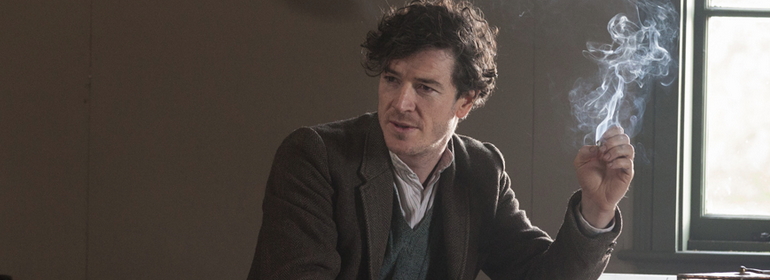The seeds of the battleground between a new, self-determined Ireland and an old Church-dominated one, are sewn in Ken Loach’s final film, ‘Jimmy’s Hall’, but the director’s trademark approach lets the whole thing down, says Peter Roche.
It’s 1932 and loveable rogue Jimmy Gralton (charismatic newcomer Barry Ward) has returned from New York with his head is full of dangerous ideas. The last thing he wants to do is re-open the old Pearse-Connolly Hall, which is what triggered him to emigrate ten years ago, but sure, what do you know? He balks under pressure by kids in the local community desperate for a bit of a dance. Oh, Jimmy!
The shameless shenanigans in the re-opened hall attract the ire of the local priest, Father Sheridan (played by Bishop Brennan. Sorry, I mean Jim Sheridan!), who is full of fire and brimstone regarding the loosening morals of young people, and Jimmy in general. Education is the remit of the Church, he maintains, not jazz music. After a fiery sermon from the pulpit, the local community is divided into two factions – those in the Lord Jesus’ corner, and those for Jimmy’s Hall, and so we’ve got Footloose, relocated to De Valera’s Ireland, where a brave pioneer is fighting to wrestle a town from the yoke of church domination.
Ken Loach’s (supposed) final film is inspired by esteemed Irish playwright Donal O’Kelly’s Jimmy Gralton’s Dance Hall, a play that fits into the director’s recent chronicling of past injustices against the Irish people. Co-written for the screen by Paul Laverty, who previously worked with Loach on the Palme D’Or winning The Wind that Shakes the Barely (2006), Jimmy’s Hall falls somewhat short of that film’s ability to stir national pride and righteous anger. The battle lines are clearly drawn – Jimmy and his enlightened contemporaries against the Church and an oppressive state – but when cast in such stark light the conflict loses its substance. Jimmy is portrayed as an infallible man, years ahead of his time, but this renders him thoroughly uninteresting. His undeclared love affair with Oonagh (a wonderfully restrained Simone Kirby) does however simmer with tension, and is the only properly developed relationship in the film.
Loach’s trademark use of non-professional actors proves a very risky move in this case, delivering mixed results. First time-actress, Eileen Henry is a delight, bringing great screen presence to her portrayal of Jimmy’s intelligent mother, as does Aisling Franciosi as the spirited daughter of an upstanding member of the ruling class. Other performances throughout the film however can’t shake the sense of it being wholly scripted, leaving my suspension of disbelief at the door, and my admiration with it.
This is a pity, because elsewhere Jimmy’s Hall captures great sense of its time and place (Sligo has never looked so beautiful on film), and the love of music and dance that’s inherent in Irish culture. However, in a pair directorial hands that didn’t insist on amateur casting, it could have been a denser and darker film, and one the real Jimmy Gralton’s of the time deserve.
Jimmy’s Hall is out in cinemas now
© 2014 GCN (Gay Community News). All rights reserved.

comments. Please sign in to comment.